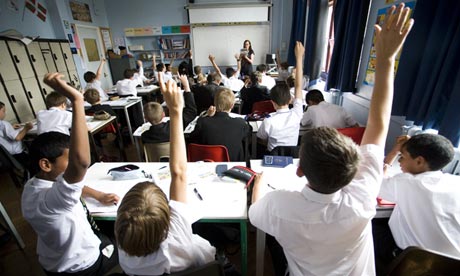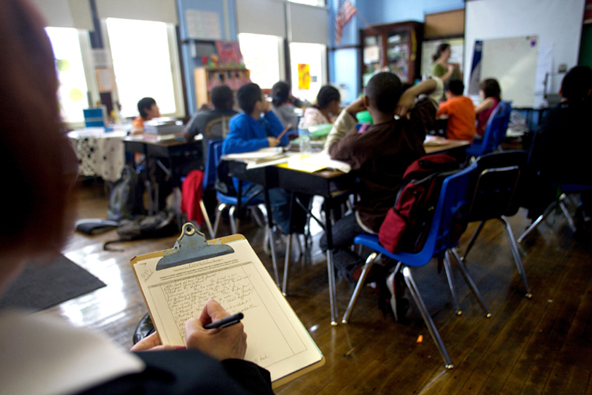
‘Every damn thing we’ve talked about at school this week has been driven by Ofsted, and not by the need to educate children effectively’ @cbradbee tweeted last Wednesday.
Even in so few words, the distress and despair of this teacher is palpable. The fact that the OFSTED obsession is interfering with, and often hindering, the effective education of the children is a sad reflection of the times we live in. No surprise, then, that this tweet also summarises the entire ethos and philosophy of schools like mine.
Absolutely everything we do, nowadays, is driven by what our SLT team expect that OFSTED will be looking for. Much tea-leaf-poring has now been distilled into a list of lesson ‘requirements’ which is, I believe, based largely on the OFSTED lesson observation criteria. Lesson perfection; lesson utopia.
And yet. There are those who profoundly disagree. According to a BBC News report (13 September) Professor Robert Coe, director of Durham University’s Centre for Evaluation and Monitoring, has declared that schools inspectors in England are basing their verdicts on evaluation methods which may not be reliable. Ofsted chief Sir Michael Wilshaw called the claims “tosh and nonsense”.

Notwithstanding Sir Michael’s opinion, the BBC report says that Prof Robert Coe, whose work has been cited by ministers, said there was no proof that Ofsted’s lesson observations led to valid judgements. Prof Coe said inspectors relied on lesson observations despite no evidence that it led to better learning. He told BBC News:
“If you sit in a classroom, everyone thinks they can judge how good the lesson is – but can you really?
“Quite a lot of research says that you can’t.”
He added that schools increasingly use classroom evaluation to monitor lesson quality internally:
“Teachers do it every week – but is it reliable?
“Teachers are trying to do what Ofsted wants – but does it really make things better?”
“If Ofsted says a lesson is no good – that’s a big deal.”
In fact, nothing could be more misleading than an Ofsted observation. In preparing for lesson observations, what is actually happening to many teachers in an awful lot of schools is more reminiscent of what Michael Jackson ultimately did to his face. He kept picking and messing to the point of ugly ruin. So obsessed was he with achieving the perfect nose, that the whole thing eventually collapsed onto his face and he had to use tape to hold it together.

This is exactly how I and so many teachers feel about the lesson observation process. Personally, I devote hours and hours of time to preparing and perfecting an all-singing, all-dancing ‘OFSTED’ lesson. I study the list of requirements, think about what kind of ‘show’ I can put on to meet all of these demands. I generally do my very best to ensure that, come the day, come the hour, no box will be left un-ticked. Usually, I also appear to fail spectacularly in my endeavours.
As evidenced a couple of weeks ago when I achieved my second ‘Requires improvement’ judgement. I know I couldn’t have tried any harder, or done any more: had my starter activity sorted and my interactive whiteboard was switched on. I had the ‘Visual, Aural and Kinaesthetic’ learning styles thing covered with a variety of materials to delight the senses. (I even had straw, coal, an old horseshoe and a ‘Victorian Ambience’ audio clip from YouTube). I had carefully marked the books using APP pre-published targets – as per my school’s policy. I had thought long and hard about germane points at which I could deliver my mini-plenaries. I had also provided a whole range of different written stimuli.
The pupils’ task was simply this: to introduce a character to a Victorian city scene, describe their appearance and demeanour, and have this person say a line or two of dialogue.
So where did I go wrong?
My final judgement feedback form noted that I should be doing the following:
- Build in more independent learning time. Make it clear to the young people that independent learning will be timed.
- Make plenary longer which would facilitate more time for self-assessment.
- Ensure opportunities for building in more numeracy – use of dates etc.
- Ensure that there is good evidence of pupil progress.
I’ll explain what all of this means, as far as I am able to understand it:
‘Independent learning‘ no longer simply means ‘working independently’. What it actually now means is ‘learning independently of the teacher’. The pupils must demonstrate that they don’t need teaching in order for learning to take place. If they don’t show that they would actually be FAR better off self-educating in a pair or group, then, it would appear, I have somehow failed in my duties.

My plenary session was seven minutes in length. Plenary sessions at my school are advised to be ‘at least ten minutes’ long. I knew I was three minutes short at the time. But, hey?
Building-in numeracy: a ridiculous requirement across all subjects. It is also absolute nonsense, unless it occurs naturally. Literacy, though, is slightly different I would concede: Literacy does occur naturally in the majority of subjects, and is therefore easier to evidence.
For this particular lesson, I actually had nine out of the fourteen tick-boxes graded as ‘good’. It was the ‘pupil progress‘ issue that snared me. According to the observation checklist, if you can’t demonstrate and evidence good pupil progress, the lesson cannot be ‘good’, no matter what. The ‘evidence-able’ progress in my lesson was judged to be ‘Requiring Improvement’.
I have argued, and will persist in arguing, that pupil progress is simply too random and subjective a concept to be featuring so strongly as a ‘pass’ or ‘fail’ issue for entire lessons. For example, I might consider that excellent progress has been made if a particular child manages to write a full sentence with a full-stop at the end and a capital letter at the beginning. Conversely, in the same class, I may be aware that a particular pupil should be capable of producing a whole page of writing, punctuated correctly and featuring adventurous vocabulary. The fact that they are unlikely to do so may not register as ‘unsatisfactory progress’ to someone who doesn’t know that child very well.
Progress means very different things to different people. It occurs to me that this is why National Curriculum Levels are such an irresistible panacea and elixir, and also such a tough habit to break. To say that a child has ‘progressed from Level 4B to Level 4A’ at least provides a handy means of appearing to be capturing progress – a bit like selling bottled sea air. Even so, it is still extremely difficult to evidence this in a single lesson.
Prof Coe suggests there are a series of “poor proxies for learning”, arguing that outward signs such as busy and motivated students and a calm and ordered classroom do not necessarily always mean that students are learning effectively and could reproduce correct answers independently.
There are, however, even wider issues than all of this to be considered; a huge elephant in the room – almost literally. The fact remains that the whole concept of lesson observations is, almost certainly, irreparably flawed. Even if the above craziness was how I taught all of the time. Even if I put on this fairground freak show for every lesson; the fact remains that no alien observer in the room would be seeing a true picture of what my teaching is really like, or how good my lessons really are. Unfortunately, lesson observations will always be a lie, an untruth, a gimcrack and a madness.

Here’s why: observers with clipboards are a viral intrusion; an invasive, insiduous presence upsetting the equilibrium of a classroom. While a good Teaching Assistant can be the cream in the coffee of the class, an observer, on the other hand, provides no benefit, whatsoever, to either teachers or pupils. They sit there with their clipboards, scrutinising, sniffing and scribbling notes and check, check, check, check-checking.

The pupils are aware there is an unwelcome intruder in the room, and this can have a variety of catastrophic consequences. The normally relaxed and perfectly competent teacher under observation is put under stress and becomes fearful of making mistakes – like when you realise a police car is behind you at the traffic lights, only much worse. All natural conduct vanishes; it is a true ‘rabbit in the headlights’ scenario.
Even teachers who have got the observed lesson technique thoroughly nailed would, I’m sure, admit that it is not how we teach all of the time. There simply aren’t enough hours in the day to be consistently planning this kind of lesson. And, in my experience, there is very little proof that kids learn better this way, anyway.
The BBC report again: ‘Prof Coe suggested that ratings given to lessons by observers could be “influenced by spurious confounds”. These included the charisma and confidence of the teacher, the subject matter being taught, students’ behaviour in the classroom and the time of day.’
Meanwhile, numerous teaching careers are being built up and broken down by the judgements of these smoke-and-mirrors masters and their apparent preference for these fake, flimsy, conjuring-trick lessons: more prestidigitation than pedagogy. The strong foundations of great and effective teaching that facilitate truthful and lasting learning so often seem to count for so little.

Surely the time has come for a complete re-think of this whole process? Observers and Inspectors: Look at the books; look at the displays; look at the damn data, then look at the results. Don’t keep looking at the teacher and expecting to see anything like an honest picture. Don’t let the jazz hands fool you.
Please follow me on Twitter: @cazzypot and like my Facebook Page, Cazzypot.


Reblogged this on The Echo Chamber.
LikeLike
It’s observation time at our school and I have witnessed teachers shrivelled up in corners in tears, others visibly shaking and all stressed for no reason other to please SMT and their insistence on the Ofsted planned lesson. Every teacher has pored over the ‘expected standards’ checklist to ensure their pre-prepared lesson will be ‘outstanding’. It’s appalling and I for one have stopped the mankey dancing, my lessons are no longer whizzed up, over prepared or dressed in special lights. I teach every observed lesson in the way I taught the day before, simple preparation for my class tha I know I can back up with evidence when challenged by SMT. I have challenged the last two observation outcomes I received abd have had both changed, but to be honest I don’t care about the outcome of a one off observed lesson any more. It’s nonsense. I teach, I make a difference, I learn from my errors and strive to be a better teacher every day.
LikeLike
There’s something deeply disturbing about educated, professional people being reduced to tears on the basis of something which has no basis in fact at all. OFSTED are enforcing ideas with no basis in scientific research as an ideology. And that’s scary.
LikeLike
Spot on – although “educated” may be a problem. Once you are paid by the Osted/SMT terror you live by it, deny it on cue but live by it just the same.
LikeLike
Reblogged this on Scenes From The Battleground.
LikeLike
I totally agree with everything said. Does anyone in management or with an inspectorial role every actually speak to teachers about the entire picture of how they manage their class and teach the children? A false snapshot system is destroying the joyful places that schools should be and simply making teachers disaffected, ill and neurotic – or past caring.
LikeLike
I wish I was as brave as you kvnmcl. But with prp being implemented next year to enable me to go down the payscale if I do not do my masters bidding, you can bet I will jump through every hoop they put in front of me… Never mind the constant emailing of my hod any time I speak to a child about their lack of effort because I know that, too, will be laid at my door. Sad times.
LikeLike
Bridge-control detached from space-ship and circling an entirely different planet is a sure sign of a system gone bonkers. That’s what seems to be happening in British schools. I refused to play the lesson criteria game, and got a ‘requires improvement’ and ‘fail’ on two consecutive internal observations – all because I refused to do anything differently from my usual lesson. I was then seen by Ofsted, did the same again (albeit petrified) – and received Good. That shows where the problem is. And my ‘A’ Level students this years scored very good results using my tried and tested methods. Draw your own conclusions…
ijstock.wordpress.com
LikeLike
Reblogged this on Learning Central and commented:
Some interesting comments on whether observing lessons is actually a good way of evaluating a school or not!
LikeLike
Thanks for this – I enjoyed your analysis of the Ofsted lesson that did not receive the grade it should have; it sounds to me as if it should have easily been a good lesson. 🙂
LikeLike
Pingback: Ofsted criteria and lesson observations | marymyattsblog
Pingback: “Outstanding”, according to lead Ofsted Inspectors | EduFlections
Pingback: Lesson observation: the mediation of Ofsted criteria | David Didau: The Learning Spy
Great post – thank you for a really clear analysis of why Ofsted is broken. I hadn’t considered the whole issue of observations in the same way – but then at my place they’re always quite supportive, and being a small school our HT has a fairly good idea of what goes on day to day anyway. That said, I agree that a one off observation is useless in terms of giving any idea of what goes on in a classroom day in day out. That’s why I think things like good marking and feedback, and good record keeping are more important now than ever.
LikeLike
Excellent post, thanks for that. We need to move beyond complaining about Ofsted towards developing a credible alternative to it and ultimately abolishing it. We teachers need to work with academics like Prof Coe and others to commission rigorous research into alternatives systems like the one that operates in Finland, one which values teachers and students as human beings rather than as cogs in an exam machine; one which gives primacy to mutual support and sharing good practice rather than high pressure judgemental inspections. And when we have developed an evidence based alternative to Ofsted, we need to build an alliance of teachers, students, parents and academics to create sufficient political pressure to force through the abolition of Ofsted.
Who is up for a serious campaign to abolish Ofsted.
@royNUT
LikeLike
Pingback: 365 days in my shoes Day 318 | high heels and high notes
Pingback: Can we make lesson observations worthwhile? | David Didau: The Learning Spy
If you teach a lesson that is massively different to the way you normally teach then you will invariably feel more nervous. Why are you changing your teaching for an observer? Surely you feel that your normal lessons are the best you can give your pupils? If not then why not?
I find the idea of altering ones lessons for observations strange. We should all be doing our best to make sure our pupils are getting the best lessons we cab give them. And if someone isn’t then they make their own problems.
If, on the other hand, lessons are being altered due to ideological difference between the teacher and the management, then the situation is different. This is a school level problem though, as Ofsted themselves suggest that there is no prescribed methodology.
One would hope that teachers would be empowered to be able to teach as they do and to be able to argue their case. If this isn’t the case. If a teacher knows that they are teaching the best lessons they can for their pupils, and their management are enforcing A radically different approach it may be time to browse the job pages.
LikeLike
Pingback: School Management Makes Teaching Impossible | cazzypotsblog
Pingback: Classroom observation: it’s harder than you think - CEM Blog - Centre for Evaluation and Monitoring
Pingback: The latest on lesson observation? | North Yorkshire Federation
Reblogged this on Bronzapunk's Blog and commented:
Amazing take on the state of education!
LikeLike
Reblogged this on Colin thinks ….. and commented:
A message from the front line.
LikeLike
Pingback: Bloggers lead the campaign to reform Ofsted | Pragmatic Education
Pingback: Bloggers lead the campaign to reform Ofsted
Pingback: Lesson Observations: Progress at Last! | cazzypotsblog
Pingback: Can teaching be given a score? | Filling the pail